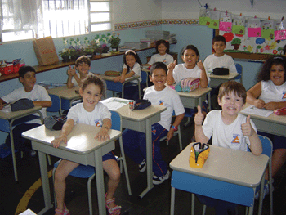Yesterday's and today's school. What are the most
recent innovations and what future steps will be
taken?
Coherently with the Government's program, we have
worked with the “screwdriver method" on the Moratti laws, taking it apart
piece by piece. This work concerned either the parts that are not shared
or those less applied: the tutor, the portfolio and the optional subjects,
the experimentation on secondary school. The most considerable part of our
work was the structure designed to define and approve the new normative
posts on which to base the school we want: a public school of quality
which leaves no one behind, meaning that it accompanies all students - all
and not one less - to the diploma or a professional qualification. With
the Financial Act of 2007 it became a law to increase the obligation for
instruction to 16 years old and the consequencial increase of the age to
enter the labour market. Also because of the Financial Act, the national
system includes the education of adults and the IFTS (Higher Instruction
and Technical Training) with their resulting stabilization and allocation
of resources. The instruction no longer ends, therefore, as occurred with
Law 53, at 19 years of age, but continues with avenues after the diploma,
even with alternatives to university, and with training throughout life,
coherently with European directions. With the decree on deregulations, we
have reintroduced technical and professional institutions, bringing back
to unity the national system for higher instruction. This way, we wanted
to increase the value of technical and professional instruction,
particulary weak today following the decisions that were made on secondary
education in Law 53. This choice is subsequently reinforced by the fact
that we had planned, in each province, the institution of polytechnical
professional cooperative facilities created to support the economic and
productive development of the area. The choice to reconstruct “little by
little” the school system is based on the firm belief that true change is
created through the work of the independent schools and an enhanced value
of the teachers' role. I know well that school autonomy is still at an
early stage (it came into effect in 2000) and in recent years it has been
strongly hampered and held back by the centre-right government. Instead,
we want to enhance its status, and for this we have introduced standards
of special importance, such as the innovation in funding modes to schools
and the institution of the National Agency for the Development of
Independence.
A small gesture for the reform of the State exam which,
with the collaboration of the parliament majority, we have approved very
rapidly because it was necessary to immediately give back
authoritativeness and credibility to it,
as a guarantee for the legal and fundamental value of the
degree received and for the protection of the commitment of students,
teachers and families. Concerning the next steps, we are working on the
new national directions, beginning from the first cycle, changing them to
those approved by Moratti, and, together, on the guidelines for the
mandatory period of two years. Two commissions are working on these
objectives and they are almost done elaborating documents on which we
intend to open a wide discussion with schools, as well as professional and
cultural organizations.
What rights and aids are guaranteed
by the law for students with disabilities?
Law 104 guarantees
students with disabilities their integration in school. I think this is a
very important principle which is still not guaranteed in many European
countries. This same law provides for the support of specialized teachers.
The Financial Act 2007 sets new conditions concerning the allocation of
specialized teachers to the independent schools: no longer based on the
ratio of one teacher for 138 students, but on the basis of the recognized
disability. I am convinced that this new modality of assigning specialized
teachers, overcoming the very strict previous constraints, will allow a
better integration of the students.
Can the system of
instruction and higher technical training offer effective answers to the
employment needs of people with disabilities?
I have the firm
belief that it is so, particularly thanks to the development of the
technical and professional areas of instruction, that we want to bring
forward and that will facilitate without a doubt the workplace integration
of young people.
All of them, not one less: what instruments are
offered by the disposition to convert the slogan into
reality?
A better link between the
knowledge an the know-how means that the school becomes truly
inclusive, and no one is left behind. In school there have to be ways of
teaching not only theoretical aspects but also practical elements. Only in
making a difference in the training and teaching possibilities, creating
personalized avenues, respecting the various ways there are to learn and
the aptitudes of each student, will we arrive at the "not one
less".
What is the meaning of school independence?
The real meaning of school independence stems from a legal
expression of a community of students who learn, of teachers, parents,
relations with local agencies and with economic, social and cultural
organizations in the territory; not like an isolated subject or in
competition. Therefore, no to the school as a business,
yes to the school as a community.

We have proposed to implement this concept through Il
Capitolone (The Big Chapter) which contains, in only two chapters of
budget, all the financial transfers from the State to the schools for
their operation, except payment for personnel. The funds, more than 2
billion 800 million Euro, are transferred directly to schools on the basis
of predetermined criteria, entrusting in them managerial autonomy,
definition of priorities and responsabilities. Moreover, I believe that
the essential value of school autonomy is in the elaboration of the
instruction offer, in the research and educational experimentation, and
the dissemination of innovations. To reach these objectives, schools need
technical, cultural, and pedagogical support. This is why the Agency was
established, whose modality will be defined eventually with a set of
rules.

